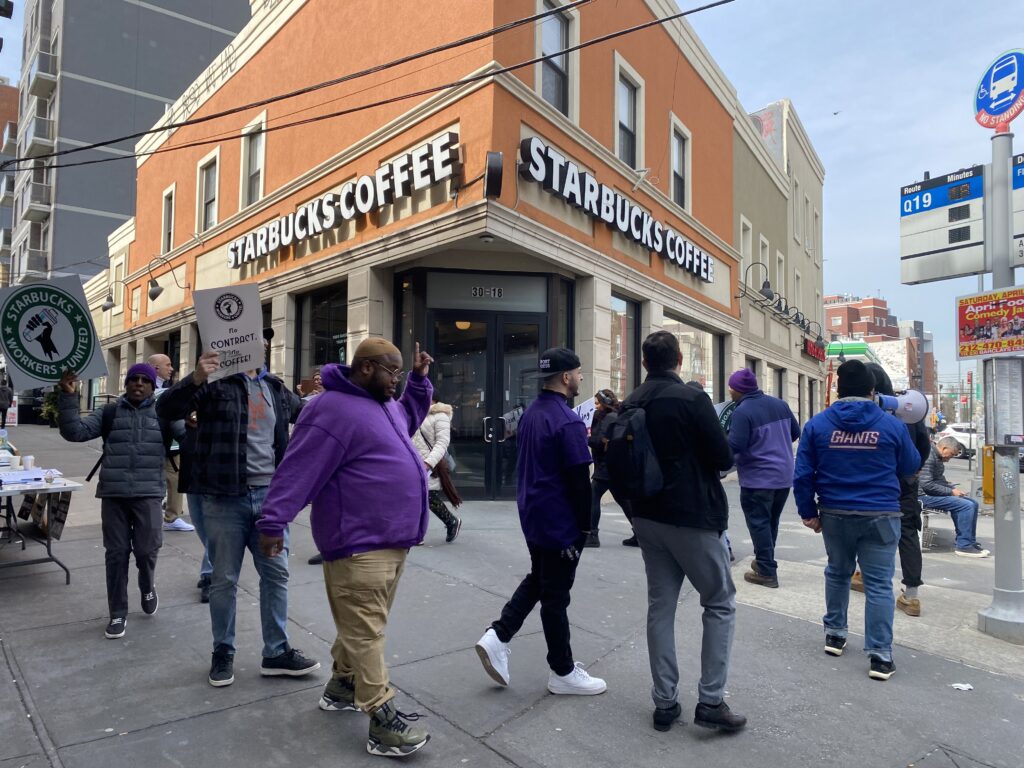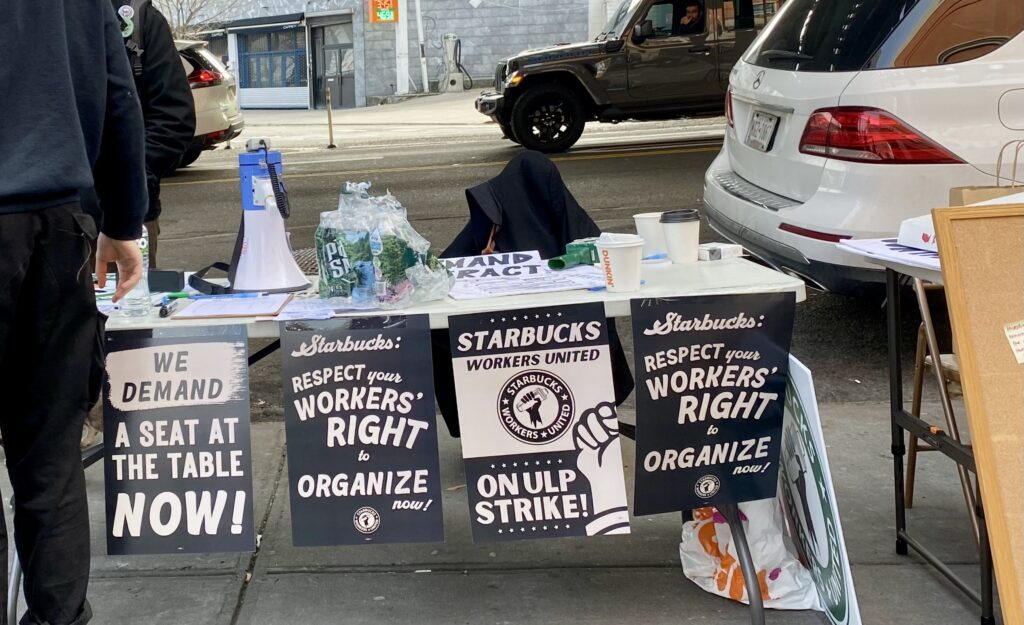
Workers and supporters chanted, “If we don’t get it, shut it down!”
By Iryna Shkurhan | ishkurhan@queensledger.com
Workers at two unionized Starbucks in Astoria joined over a hundred stores across the country to strike for fair labor practices on March 22, the same day as the company’s ‘Founder’s Day’ celebration.
The majority of workers at the store on Astoria Boulevard and the corner of 31st Street, were outside at 7 a.m., armed with posters and chanting their demands for a contract negotiation to secure better wages and working conditions. Despite the train loudly rumbling overhead and complaints of strained voices, close to 20 people marched on the corner until 1pm.
“I’m happy to join other union stores on strike today because it’s never been more necessary than right now,” said James Carr, a Starbucks partner for four years. “Our union is small but now unstoppable, and we’re ready to start making moves.”
This location became the first Starbucks store in Queens to unionize after securing a unanimous vote on June 6, 2022 following a months-long effort in which one employee was illegally fired for unionizing. But, despite the successful unionization of 280 stores since 2019, not a single contract has been signed in food faith due to Starbucks failing to negotiate with union representatives. Workers say that while unionization has given them more bargaining power and a sense of national solidarity, they are still experiencing unfair labor practices such as illegal cuts to work hours and inconsistent scheduling.
“There’s a huge disconnect here between what we’re seeing on the shop floor, and the kind of money that executives are making,” said Maria Flores, who has worked at this location for three years. “We’re being priced out of New York as it is. We can’t afford rent, we can’t pay bills, we can barely afford our medical coverage.”
Outgoing Starbucks CEO, Howard Shultz, is being investigated for union busting that started in 2019. He is set to testify before the Senate Committee on Health, Education, Labor and Pensions on March 29, to avoid being subpoenaed. Shultz stepped down as CEO on March 20, two weeks earlier than previously announced amid growing scrutiny. He still remains on the Board.
“Rather than publicizing rallies and protests, we encourage Workers United to live up to their obligations by responding to our proposed sessions and meeting us in-person to move the good faith bargaining process forward,” said a Starbucks spokesperson in an email to the Queens Ledger.

A Dunkin cup and bag can be seen at the table the organizers of the strike set up.
Workers say that Starbucks has failed to meet them at the bargaining table in an earnest way. Earlier this month, prosecutors at the National Labor Relations Board (NLRB) alleged that Starbucks violated labor law by refusing to engage by refusing to bargain if some workers attended the session remotely. The objection to the hybrid model in negotiation sessions has been the main way Starbucks has delayed granting unionized stores their demands.
Several workers said that the company is illegally cutting their work hours under the New York Fair Work Week Law in Fast Food that bans a reduction of work hours by more than 15% week to week. After the rush of the holiday season is over, employees typically know to expect a reduction in hours due to a slower rush.
According to the law, employees are entitled to a regular schedule that has at least 85% of the work hours in their baseline regular schedule. Employers cannot request employees to consent to a reduction, but hours can be reduced if there is a just cause or good faith economic reason.
Workers allege that there is a four dollar pay differential between shift supervisors whose responsibilities include tracking inventory, opening and closing the store and handling money, compared to baristas who are responsible for taking orders and preparing food and beverages. Employees say that at this location, shift supervisors are being denied both covering barista shifts and shift supervisor shifts due to the pay differential.
“We make every effort and have invested significant resources to ensure partner scheduling practices are in alignment with New York City’s Fair Workweek Law,” said the Starbucks spokesperson by email.
Employees on strike say that the inconsistency in scheduling is affecting their financial security and ability to afford essentials amid inflation and a rising cost of living in New York City.
“We’re being nickeled and dimed here at the store level,” said Flores.
On Wednesday, workers filed an additional ten complaints against Starbucks to the NYC Department of Consumer and Worker Protection (DCWP), after filing 28 complaints last month. DCWP confirmed that there is an open investigation into complaints around the NYC Fair Workweek Law.
Last July, Austin Locke was fired from the Astoria Blvd. location for engaging in unionization efforts following a successful vote. He was reinstated with $21,000 in back pay and penalties after DCWP found that his termination was in violation of the “just cause” protections of the Fair Workweek Law.
On a wider scale, the NLRB has issued 80 complaints against Starbucks, including illegally firing more than a dozen workers in retaliation for unionizing across the country. There have been over 500 unfair labor practice charges lodged against this company.
During the time of the strike, the store appeared empty and was not accepting mobile orders as usual. Two employees, and the general manager, did not participate in the strike and were able to keep the store open despite low traffic due to community support of the strike.
A table outside the store held up signs that read “We Demand a Seat at the Table Now!” and “Starbucks: Respect your Workers’ Right to Organize.” Next to a megaphone, sat a Dunkin’ cup.


